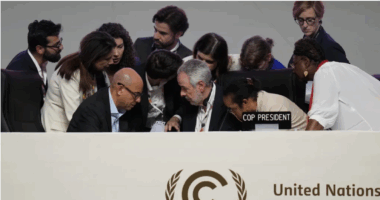Climate, Health and Equity Brief
Make America Toxic Again
June 30, 2025

The Climate, Health & Equity Brief is GMMB’s take on the latest news on the current impacts of climate change. If you haven’t subscribed yet, you can do so by clicking here.
Hot Topic: Danger ahead. June marked an escalation in federal efforts to dismantle climate progress. From proposing the elimination of power plant pollution limits, to announcing the shutdown of agencies tasked with protecting public health and safety, to advancing a “big beautiful bill” that is anything but, the Trump administration and Congressional Republicans are moving full steam ahead to weaken the institutions, incentives, and safeguards that have underpinned U.S. climate action.
Just weeks into hurricane season, the administration announced it is terminating the Defense Meteorological Satellite Program, the U.S. military satellite system that provides the data forecasters rely on to detect rapid hurricane intensification. The termination takes effect Monday, an abrupt move that experts warn will cripple storm tracking, hobble emergency response, and put millions of coastal residents at greater risk.
The EPA’s proposed repeal of Biden-era power plant pollution limits—still open for public comment until August 11—would eliminate federal restrictions on carbon emissions from coal- and gas-fired plants, which together account for roughly 25% of U.S. emissions. The proposal would also weaken the Mercury and Air Toxics Standards (MATS), which protect communities from neurotoxins and fine particulate pollution linked to asthma, heart disease, and premature death.
The administration’s FY 2026 budget also proposes eliminating the U.S. Chemical Safety Board (CSB), the only federal agency that investigates major chemical accidents and recommends safety reforms. Hundreds of chemical incidents occur annually in the U.S., many causing death, injury, or serious damage. The planned shutdown, slated to begin later this year, would end critical oversight and investigations into major incidents and leave communities near industrial sites exposed to greater risks without a watchdog to protect communities from repeated harm.
Meanwhile, at the other end of Pennsylvania Avenue, the so-called “One Big Beautiful Bill”—a sweeping Republican reconciliation package—is under active Senate debate, with a final vote expected as soon as this weekend. As it stands, the bill would repeal most clean energy tax credits created by the Inflation Reduction Act, including those for wind, solar, electric vehicles, hydrogen, batteries, and clean manufacturing—rollbacks that analysts warn could increase U.S. emissions by up to 1 billion tons annually by the 2030s.
Notably, the bill also includes “Sunset Act”-style provisions that would automatically terminate existing federal environmental regulations—including those on clean air, water, hazardous waste, and climate—unless Congress explicitly reauthorizes them. If passed, these provisions won’t just tweak policy—they will bring regulatory chaos and endanger the entire legal foundation for environmental protection.
Together, this month’s developments mark a strategic redefinition of the federal government’s role in environmental protection—one that prioritizes deregulation and fossil fuel expansion over science, equity, and the health of all Americans.
Human Health
Over 280 U.S. locations broke daily heat records this week as a heat dome trapped dangerously hot, humid air over nearly 130 million people, causing surges in heat-related illness and marking the most widespread and intense heat wave in over a decade. (Axios, The Washington Post)
A new analysis finds that nearly 76% of children in the 65 largest U.S. cities attend public schools in neighborhoods that are at least 8°F hotter due to the built environment. (Climate Central)
Yet another new study shows that climate change is intensifying sleep apnea for millions of Americans, with hotter nights causing a 45% higher probability of the disruptive sleep disorder on any given night. (Fortune)
Planetary Health
A new study finds that much of the ocean has breached a critical acidity threshold due to increased CO2 emissions, which form carbonic acid in water, endangering marine ecosystems, threatening coastal economies, and weakening the ocean’s ability to provide the surface with food and oxygen. (The Hill)
A new analysis reveals that emperor penguin populations in certain parts of Antarctica have declined by 22% since 2009—twice as rapidly as the worst-case climate projections—raising concerns that the species may face extinction even sooner than previously feared. (CBS News)
A new study in Nature finds that even with farmers’ best adaptation efforts, every degree of warming reduces food production by 4.4%, threatening global food security and particularly affecting the U.S. Corn Belt, which could experience yield losses averaging 41% by 2100 under high-emissions scenarios. (Phys.org)
Equity
A new study finds that people experiencing homelessness are 27 times more likely to visit emergency rooms for heat-related illnesses than the general population, underscoring how extreme heat disproportionately endangers the most vulnerable. (The Washington Post)
As recent Zillow analysis finds that minority homeowners face disproportionately higher risks from extreme heat, flooding, wind, and air pollution due to historic housing inequities, with experts warning that rising costs and trouble selling vulnerable properties could deepen the racial wealth gap. (Axios)
A new Media Matters study finds that ABC, CBS, and NBC aired just seven environmental justice news segments in 2024, marking a continued decline in coverage as climate threats to marginalized communities escalate under the Trump administration. (Media Matters)
Canada’s wildfire season has already burned nearly 10 million acres—six times the 10-year annual average—with Indigenous First Nations communities, who face significant gaps in the region’s emergency infrastructure, making up more than half of those displaced. (Grist, The Washington Post)
Politics & Economy
Administration Watch:
- The Trump administration is cutting off critical storm forecasting data by ending the Defense Meteorological Satellite Program, a move experts warn will put millions at greater risk. (AP News)
- The Department of Justice says Mr. Trump can abolish national monuments, reversing an 87-year precedent and potentially opening millions of protected acres to drilling and mining. (The Washington Post)
- NOAA’s Climate.gov will stop publishing new content after nearly all staff were fired, sparking concerns of political interference to suppress public climate science. (The Guardian)
- Mr. Trump’s EPA has proposed revoking federal limits on climate pollution from power plants despite U.S. plants accounting for 25% of U.S. emissions and ranking above all but five countries in carbon output. (POLITICO)
- The Trump administration is shutting down the U.S. Chemical Safety Board, leaving ongoing probes unfinished and gutting oversight as chemical incidents occur nearly every other day nationwide. (Grist)
- FEMA’s disaster command chief resigned after Trump announced plans to phase out the agency by November and shift disaster response to states. (The New York Times)
- For the first time in 30 years, the U.S. skipped global climate talks in Bonn, prompting some delegates to see its absence as a chance for progress without the world’s top fossil fuel producer in the room. (Inside Climate News)
- The Trump administration plans to roll back protections on nearly 59 million acres of roadless national forest, opening them to logging and roadbuilding despite strong opposition from environmental groups. (Washington Post)
The Senate is negotiating changes to the House-passed version of the so-called “Big Beautiful Bill,” aiming to soften some of the House’s harshest clean energy cuts but still phasing out solar, wind, residential energy, EV, and hydrogen credits far quicker than current law, with a vote expected imminently. (Utility Dive)
A GOP push to force the U.S. Postal Service to sell off its new electric vehicles is facing backlash from USPS leaders and unions, who warn it would waste hundreds of millions already spent on EVs and charging infrastructure and reverse over a decade of planning to modernize the aging mail fleet. (POLITICO)
A federal judge has ruled that the EPA unlawfully terminated $600 million in environmental justice grants in February, saying the agency exceeded its authority by refusing Congress’s directive to fund programs aiding disadvantaged communities—a decision the EPA is expected to appeal. (POLITICO)
New York Governor Kathy Hochul (D) directed the state’s power authority to develop a new nuclear power plant for the first time since 1989, aiming to create a cleaner, more reliable and affordable electric grid that supports large manufacturers and replaces aging fossil fuel plants. (AP News)
General Motors announced it will spend $4 billion on mostly gasoline-powered vehicles and abandon its previous goal of manufacturing exclusively EVs by 2035, despite selling 37,000 EVs in the first quarter of the year and becoming the number two EV maker in the U.S. (POLITICO)
Months before hosting COP30, Brazil is expediting oil drilling, highway expansions, and legislation rolling back environmental and Indigenous land protections, contradicting President Lula’s previous climate pledges. (The Associated Press)
Italy’s independent budget watchdog predicts that extreme weather due to climate change will cost the country up to 5.1% of its GDP by 2050. (Reuters)
Spain is pursuing rare criminal charges against regional officials for failing to issue timely flood alerts before a storm killed 228 in Valencia—marking a landmark effort to hold leaders accountable for preventable climate disaster deaths. (The Washington Post)
A new Accenture analysis warns that carbon emissions from AI data centers could grow 11-fold by 2030 unless companies adopt efficient hardware, smarter model choices, and new metrics designed to weigh AI’s true environmental cost. (Axios)
And yet, another new study suggests that if regulated wisely, AI could cut up to 5.4 billion metric tons of global emissions annually by 2035—more than offsetting the climate impact of its data centers—by improving transportation, energy use, and food systems. (Scientific American)
Senate Republicans, led by Sen. Mike Lee (R-UT), have revised a controversial plan to sell up to 1.2 million acres of Bureau of Land Management land—down from over 3 million—though the proposal still faces legal hurdles and strong Democratic opposition. (The Hill)
Action
After its devastating 2011 flood, Copenhagen launched an ambitious, citywide climate adaptation plan with “sponge parks” and underground flood tunnels, offering a scalable model for other cities grappling with urban floods. (NPR)
More than 200 climate groups have issued a unified call to reform UN climate talks by replacing consensus-based decision-making with voting, curbing fossil fuel industry influence, and setting stricter criteria for COP hosts, arguing the current process fails to deliver meaningful climate action. (Climate Change News)
A first-of-its-kind carbon calculator designed for sports teams is helping major sports organizations, such as Liverpool FC, World Athletics and LIV Golf, track and cut their carbon emissions, marking a significant step toward the industry’s goal of cutting its carbon footprint in half by 2030. (TIME)
Designer and inventor Joe Doucet has developed a color-changing house paint that is light in warm weather and darker in cooler temperatures to maximize natural temperature control and reduce overall energy needs for heating and cooling. (CNN)
Life as We Know It
Nearly a year after Hurricane Helene tore through Appalachia, rafting guides are navigating drastically altered rivers, with shifted rapids, routes blocked by debris, and rafting businesses shuttered, highlighting how climate-driven storms are upending the outdoor tourism economy. (Grist)
Kicker
Curious about ocean warming? Explore this interactive map to see how marine heatwaves are spreading globally and driving ocean temperatures to record highs.
“Pollution should never be the price of prosperity.”
– Al Gore
The GMMB Climate, Health & Equity Brief would not be possible without the contributions of the larger GMMB team—Catherine Ahmad, Stefana Hendronetto, Nikki Melamed, Sharde Olabanji, Kenzie Perrow and Marci Welford. Feedback on the Brief is welcome and encouraged and should be sent to [email protected].




